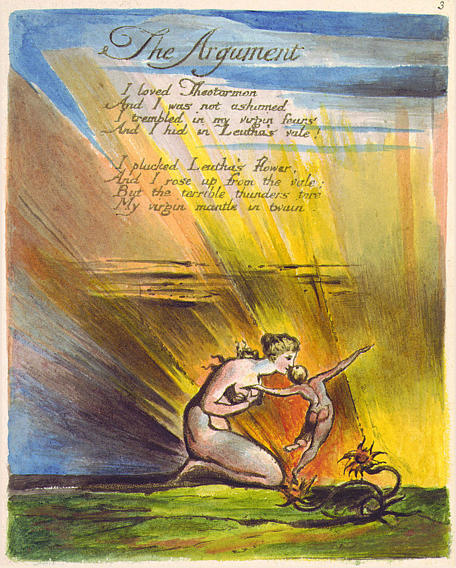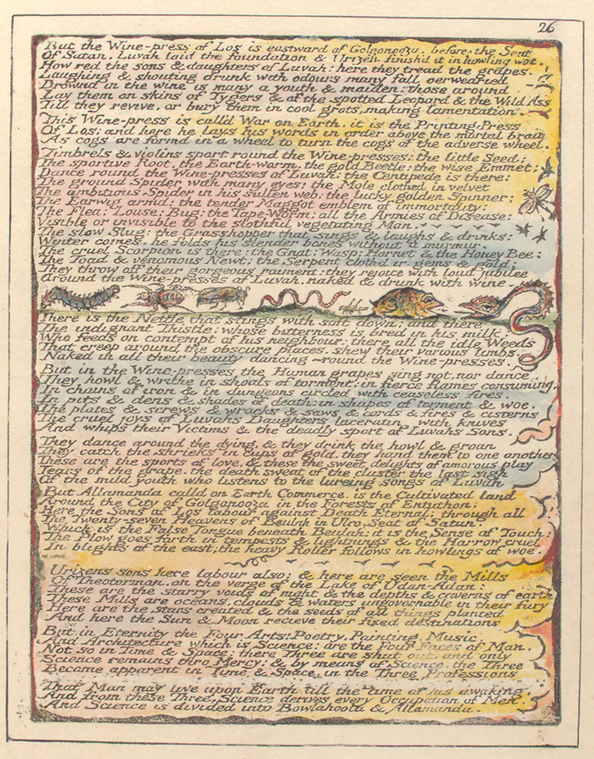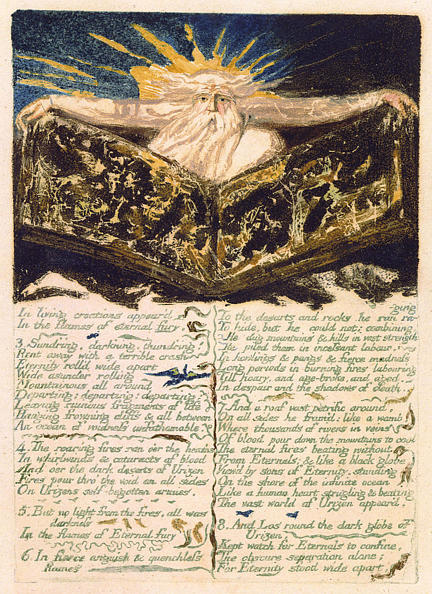 |
Wikipedia Commons Visions of the Daughters of Albion Plate 3 Oothoon kissing the winged joy as it flies. |
Songs and Ballads, (E 470) "Eternity He who binds to himself a joy Does the winged life destroy But he who kisses the joy as it flies
Lives in eternity's sun rise"
Milton, Plate 26 [28], (E 123)
"as the Spectres choose their affinities
So they are born on Earth, & every Class is determinate
But not by Natural but by Spiritual power alone, Because
The Natural power continually seeks & tends to Destruction
Ending in Death: which would of itself be Eternal Death
And all are Class'd by Spiritual, & not by Natural power.
And every Natural Effect has a Spiritual Cause, and Not
A Natural: for a Natural Cause only seems, it is a Delusion
Of Ulro: & a ratio of the perishing Vegetable Memory."A Vision of The Last Judgment, [Page 91], (E 563)"Many suppose that before the Creation All was Solitude and Chaos. This is the most pernicious Idea that can enter the Mind as it takes away all sublimity from the Bible and Limits All Existence to Creation and to Chaos-- to the Time and Space fixed by the Corporeal Vegetative Eye, and leaves the Man who entertains such an Idea the habitation of Unbelieving Demons. Eternity Exists and All things in Eternity Independent of Creation which was an act of Mercy. I have represented those who are in Eternity by some in a Cloud within the Rainbow that Surrounds the Throne. They merely appear as in a Cloud when any thing of Creation, Redemption, or Judgment are the Subjects of Contemplation tho their Whole Contemplation is Concerning these things. The Reason they so appear is The Humiliation of the Reasoning and Doubting Selfhood and the Giving all up to Inspiration. By this it will be seen that I do not consider either the Just or the Wicked to be in a Supreme State but to be every one of them States of the Sleep which the Soul may fall into in its Deadly Dreams of Good and Evil when it leaves Paradise following the Serpent."
Marriage of Heaven And Hell, Plate 5, (E 36)
"Eternity is in love with the productions of time."Marriage of Heaven And Hell, Plate 8, (E 36)
"The roaring of lions, the howling of wolves, the raging of the
stormy sea, and the destructive sword. are portions of
eternity too great for the eye of man."Visions of daughters of Albion, Plate 5, (E 49)"Does not the worm erect a pillar in the mouldering church yard?
Plate 6
And a palace of eternity in the jaws of the hungry grave
Over his porch these words are written. Take thy bliss O Man!
And sweet shall be thy taste & sweet thy infant joys renew!" Song of Los, Plate 3, (E 67)The human race began to wither, for the healthy built
Secluded places, fearing the joys of Love
And the disease'd only propagated:
So Antamon call'd up Leutha from her valleys of delight:
And to Mahomet a loose Bible gave.
But in the North, to Odin, Sotha gave a Code of War,
Because of Diralada thinking to reclaim his joy.
Plate 4
These were the Churches: Hospitals: Castles: Palaces:
Like nets & gins & traps to catch the joys of Eternity
And all the rest a desart;
Till like a dream Eternity was obliterated & erased."
Milton, Plate 10[11], (E 104) "Every thing in Eternity shines by its own Internal light: but thou
Darkenest every Internal light with the arrows of thy quiver
Bound up in the borns of jealousy to a deadly fading Moon" Milton, Plate 17 [19], (E 111)"For travellers from Eternity. pass outward to Satans seat,
But travellers to Eternity. pass inward to Golgonooza." Milton, Plate 24 [26], (E 121)"Los is by mortals nam'd Time Enitharmon is nam'd Space
But they depict him bald & aged who is in eternal youth
All powerful and his locks flourish like the brows of morning
He is the Spirit of Prophecy the ever apparent Elias
Time is the mercy of Eternity; without Times swiftness
Which is the swiftest of all things: all were eternal torment:" Milton, Plate 30 [33], (E 129)"Lo the Eternal Great Humanity
To whom be Glory & Dominion Evermore Amen
Walks among all his awful Family seen in every face
As the breath of the Almighty. such are the words of man to man
In the great Wars of Eternity, in fury of Poetic Inspiration,
To build the Universe stupendous: Mental forms Creating"Milton, Plate 31[34] "These are the Gods of the Kingdoms of the Earth: in contrarious
And cruel opposition: Element against Element, opposed in War
Not Mental, as the Wars of Eternity, but a Corporeal Strife" Annotations to Watson, (E 611) "But to him who sees this mortal pilgrimage in the light that
I see it. Duty to country is the first
consideration & safety the last
Read patiently take not up this Book in all idle hour the
consideration of these things is the whole
duty of man & the affairs of life & death trifles sports of time
<But> these considerations business of Eternity"



_object_32_The_Clod_%26_the_Pebble.jpg)

